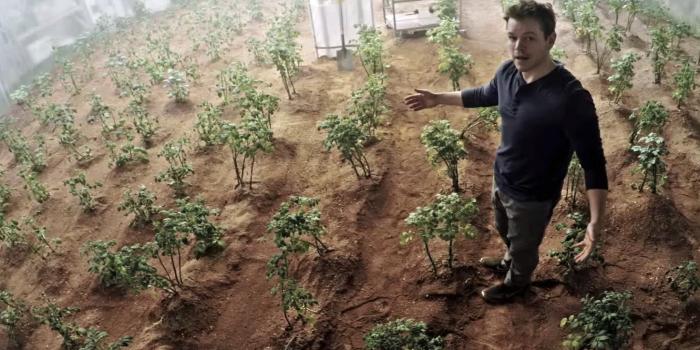
The recently released film, The Martian, showed an astronaut stranded on Mars growing potatoes while living in an artificial habitat. Guess what! This may soon become reality.
A team of Australian scientists have unearthed a gene in a "magical" plant that could help grow food in space. This could especially ease human missions, including the one to Mars.

Professor Peter Waterhouse with the plant. (Photo: Videograb/eurekalert.org)
The remakable study has been carried out by Professor Peter Waterhouse, a plant geneticist at the Queensland University of Technology. The gene was discovered in the ancient Australian native tobacco plant Nicotiana benthamiana - known as Pitjuri to indigenous aboriginal tribes.
The Magical plant
For decades, the Pitjuri plant has been used by geneticists as a model plant upon which to test viruses and vaccines. Because of its amazing properties, the scientists call it the 'magical' plant.
Watch: Professor Peter Waterhouse talking about the discovery.
"By sequencing its genome and looking through historical records, we have been able to determine that the original plant came from the Granites area near the Western Australia and Northern Territory border, close to where 'Wolf Creek' was filmed," Waterhouse explained.
By using a molecular clock and fossil records, the team found that this particular plant has survived in its current form in the wild for around 750,000 years.
A breakthrough for research
Scientists claim that the discovery can have a big impact on future plant biotechnology research. It is being said that the plant is equivalent of the mouse used in medical research.
The plant has lost its "immune system" and has done that to focus its energies on being able to germinate and grow quickly, rapidly flower, and set seed after even a small amount of rainfall.
The plant has worked out how to fight drought - its number one predator - in order to survive through generations.
"The Martian, which involved an astronaut stranded on Mars growing potatoes while living in an artificial habitat, had a bit more science fact than fiction than people might think," professor Waterhouse informed.
The findings also have implications for future genetic research on Earth.


![BJP's Kapil Mishra recreates Shankar Mahadevan’s ‘Breathless’ song to highlight Delhi pollution [WATCH] BJP's Kapil Mishra recreates Shankar Mahadevan’s ‘Breathless’ song to highlight Delhi pollution [WATCH]](http://images.catchnews.com/upload/2022/11/03/kapil-mishra_240884_300x172.png)

![Anupam Kher shares pictures of his toned body on 67th birthday [MUST SEE] Anupam Kher shares pictures of his toned body on 67th birthday [MUST SEE]](http://images.catchnews.com/upload/2022/03/07/Anupam_kher_231145_300x172.jpg)






